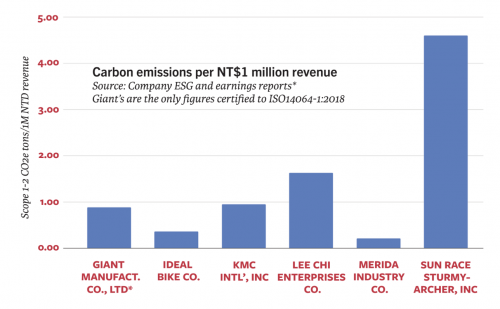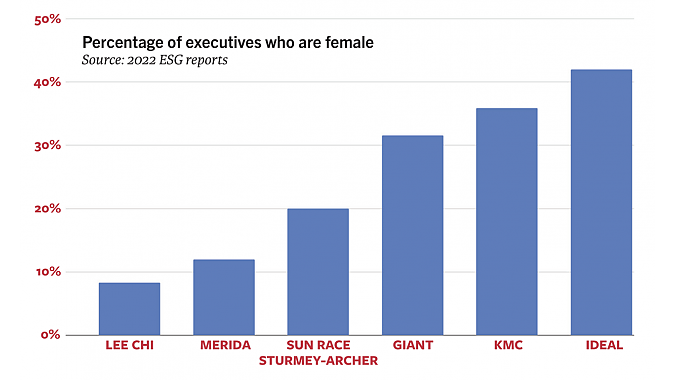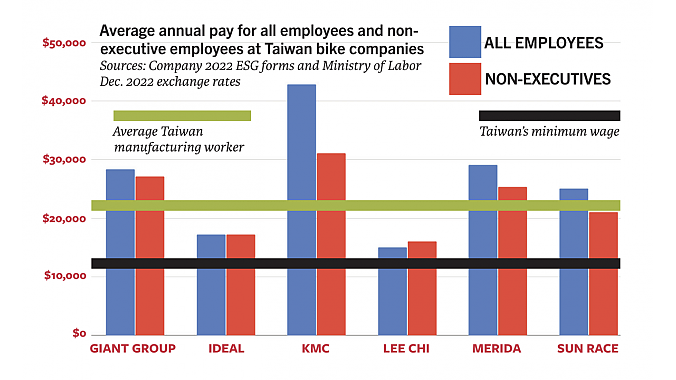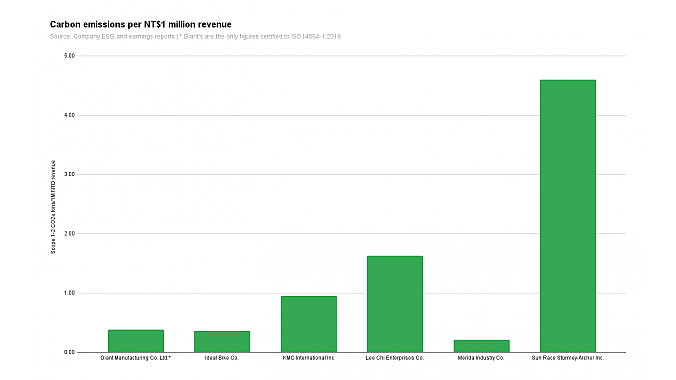This article is corrected. In the sentence that begins "Sun Race's total emissions were 1,128 tons ..." we used an incorrect figure for Giant Group's 2022 revenues. The correct number is NT$92 billion. We also updated the chart for emissions compared to revenue to correspond to the correct revenue figure. We apologize for the error.
A version of this article ran in the August issue of Bicycle Retailer & Industry News. Retailers can get the print or digital version of the magazine free — subscribe at this link.
TAIPEI (BRAIN) — In the U.S., the concept of Environmental, Social and Governance reports has set off an economic/cultural "debate," as so many things do. Presidential hopeful Gov. Ron DeSantis even signed legislation "to protect Floridians from the woke environmental, social, and corporate governance (ESG) movement" that apparently burdens the good citizens of the Sunshine State.
But in Taiwan, ESG reports offer some useful data. Taiwan analysts have noted that the European Union is preparing to impose carbon tariffs on imports, phased in starting in 2026. While details of that tax are developing, it's good business for exporters to start measuring — and actively reducing carbon emissions in particular.
"The collection of carbon border tariffs, AKA. the 'green inflation,' will pose great impact on Taiwan's manufacturing-based industries," Lee Chi Enterprises notes in its 2022 annual report. The brake and component maker added that the EU tariffs will make "carbon reduction no longer an option for enterprises but a must for future competitiveness."
In another contrast, Western companies' ESG reports are a showcase for corporate design experts and content producers, offering featuring colorful slides and infographics. But Taiwan simply requires companies to put numbers in 24-row spreadsheets they file with the stock exchange.
Taiwan starting requiring the annual reports last year, with the second year's reports published in late June. The country does not — yet — require companies to use standardized methods to compile their numbers, perhaps explaining why some figures are, inexplicably, wildly different from company to company.
We looked at reports from six Taiwanese companies traded on the Taipei stock exchange that are primarily bike suppliers.
E is for Environmental
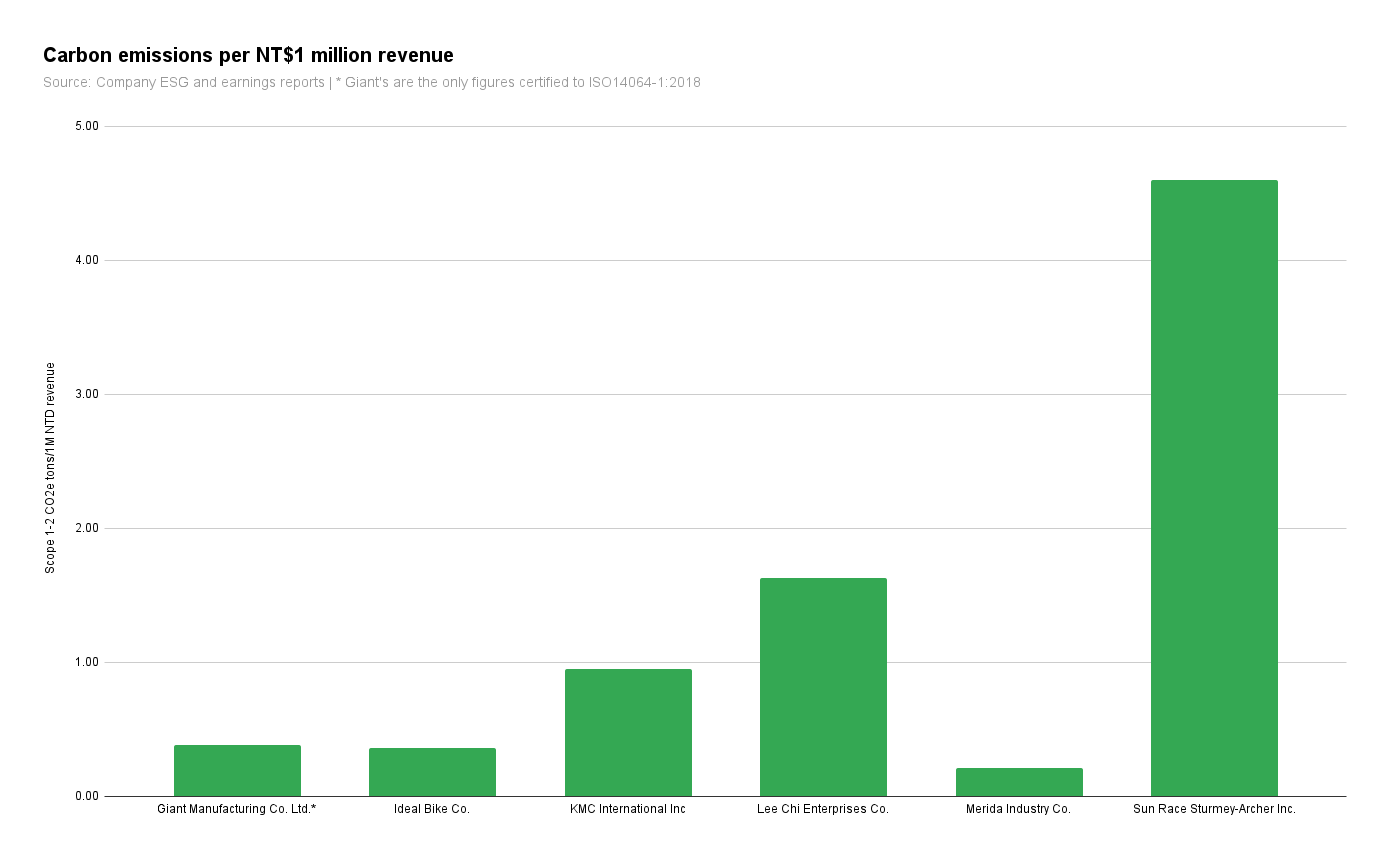
Carbon emissions are probably the most examined environmental measurement in ESG reports.
For an explanation of C02e tons and Scopes 1, 2, and 3, we suggest a visit to Professor Google. But in short, Scope 1 records direct emissions by a company and Scopes 2 and 3 account for emissions that are a consequence of the company's activities but emitted by other companies. The bike manufacturer Ideal and hub-maker Sun Race did not provide Scope 3 figures in their ESG reports, so we constructed the chart below by totaling Scopes 1 and 2 for all the companies, compared to their reported 2022 revenues.
In raw numbers, Giant's emissions dwarf the others at 34,700 tons of C02e emissions for Scopes 1 and 2. The next largest was fellow bike manufacturer Merida at 6,800 tons. But Giant is the largest company examined and in tons of C02e emitted per million dollars in revenue, Giant is below chain maker KMC, brake/component maker Lee Chi and Sun Race. It's worth noting that only Giant specified that its figures were certified to an ISO standard by a third-party organization, the Association Francaise de Normalisation (AFNOR). Other companies didn't specify in their ESG what standard they used, but several have said elsewhere that they are working with ISO 14064-1 and the Greenhouse Gas Protocol on emissions.
Sun Race's total emissions were 1,128 tons, the smallest of the six companies. But its revenues were just NT$244 million ($7.8 million) last year, while Giant's were NT$92 billion.
Water use is also closely watched. Giant reported use of 2.8 million tons of water, far above the others even when compared to its revenues. The second biggest user was Merida at a reported 121,000 tons.
None of the companies said whether their water use figures are certified. (By comparison, Shimano, which files an ESG report in Japan, said it used about 1.6 million tons of water last year across all its operations.)
In waste produced, Giant again reported numbers far above the others, at 26,300 tons, more than ten times the figure reported by Merida, the second biggest producer of waste. None of the companies reported that their waste measurement was certified in any manner.
S is for Social
The Social numbers are more straightforward measurements. Factors tallied include the average cost of employee benefits; the average salary of all employees and of non-executive employees; the median salary of non-executives, the percentage of female executives and the number of occupational accidents.
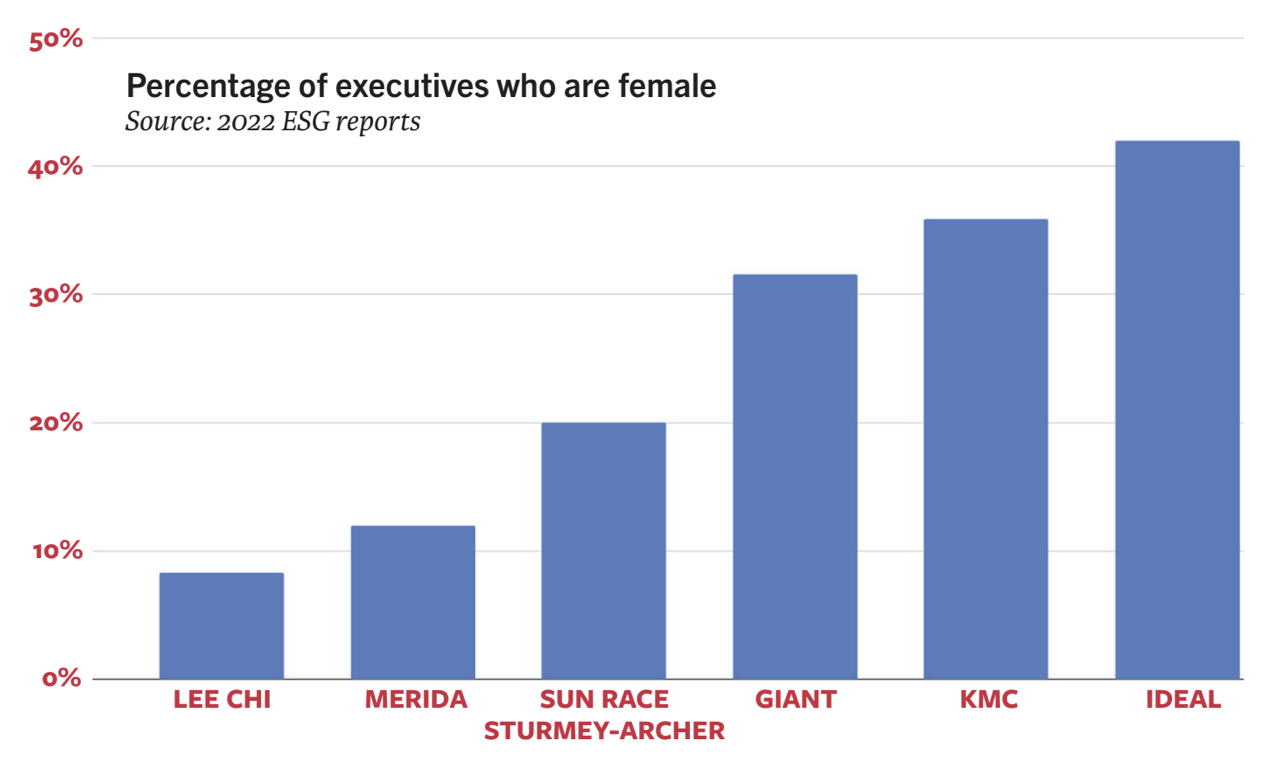
Average salaries for non-executives ranged from $16,000 a year at Lee Chi to nearly $31,000 at KMC (December 2022 exchange rates). Lee Chi is the only company whose non-executive employee, on average, makes more than the company average.
The average annual salary for a manufacturing employee in Taiwan in 2022 was $23,679 according to Taiwan's Ministry of Labor. The minimum wage was a bit over $10,000 a year.

Benefit costs per employee ranged from NT$571,000 per employee (Lee Chi) to NT$1,509 (KMC).
The percentage of executives who are female ranged from 8% (Lee Chi) to 42% (Ideal).
Occupational injuries, as a percentage of revenue, ranged from zero (Ideal, KMC and SunRace) to 0.74% at Lee Chi. Giant's rate was 0.47% and Merida's was 0.15%.
G is for Governance
In the Governance category, Taiwan's stock exchange is gathering information on the number of independent directors; the number and percentage of seats held by females; the ratio of directors meeting a required number of training hours; and the number of investor conferences held.
The number of female board members is probably of most interest to ESG report enthusiasts. Lee Chi leads the way with four of its seven directors female. Next was Sun Race with three out of its nine directors female. Then Merida (3 out of 13), KMC (1 out of 7), Giant (1 out of 11). Ideal, with the highest percentage of female executives at 42%, has no females on its board of seven.
Giant had 12 investor conferences, KMC says it had 100, and everyone else reported they had one last year.

